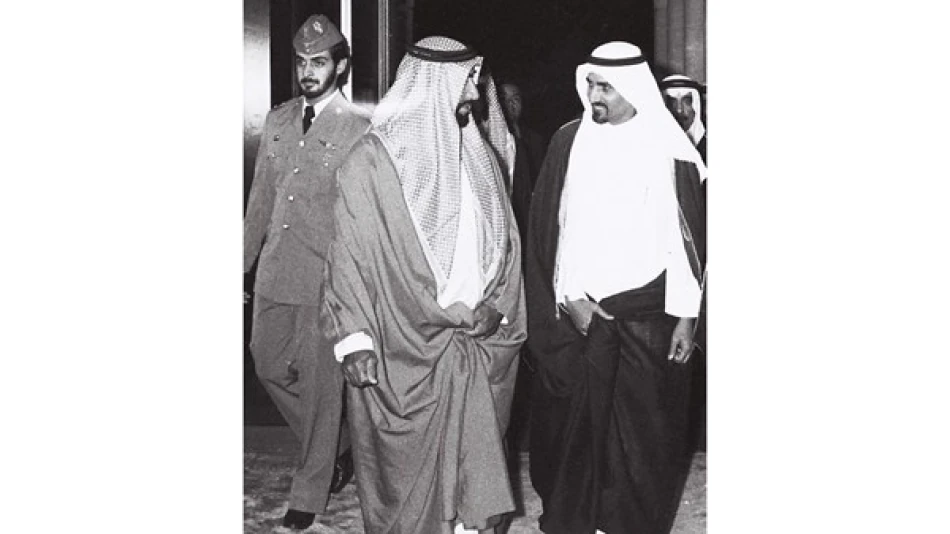
Emirati Leader Hamad Al Sharqi's 51-Year Dedication to Serving His Nation
Fujairah's Five-Decade Transformation: How Strategic Vision Built a Regional Powerhouse
After 51 years of leadership under Sheikh Hamad bin Mohammed Al Sharqi, the emirate of Fujairah has evolved from a resource-scarce region into a vital economic hub on the Indian Ocean, demonstrating how strategic positioning and diversified development can create lasting prosperity. The emirate's transformation offers valuable lessons for emerging economies seeking sustainable growth beyond traditional resource dependencies.
From Scarcity to Strategic Advantage
When Sheikh Hamad assumed leadership of Fujairah in 1973, the emirate faced significant challenges with limited natural resources and basic infrastructure. Drawing inspiration from the UAE's founding fathers, particularly Sheikh Zayed bin Sultan Al Nahyan, the ruler adopted a long-term vision focused on human development, cultural preservation, and strategic economic positioning.
The emirate's location on the Indian Ocean, initially seen as peripheral, became its greatest asset. Unlike Dubai's focus on trade and Abu Dhabi's oil wealth, Fujairah carved out a unique niche as the UAE's eastern gateway, bypassing the congested Strait of Hormuz for oil exports and maritime trade.
Economic Diversification Strategy
Maritime and Energy Leadership
Fujairah's crown jewel, the Fujairah Oil Industry Zone (FOIZ), has emerged as a global petroleum hub with storage capacity reaching 200,000 barrels per day in refining capacity. This positions the emirate as a critical player in regional energy security, attracting massive international investments from oil majors seeking strategic storage and bunkering facilities.
The development mirrors Singapore's successful model of becoming an energy trading hub through strategic location and infrastructure investment, though Fujairah benefits from proximity to major oil producers and lower operational costs.
Beyond Oil: Tourism and Renewable Energy
Recognizing the long-term risks of oil dependency, Fujairah has aggressively diversified into tourism, renewable energy, light manufacturing, and logistics services. This approach reflects lessons learned from the 2008 financial crisis and recent oil price volatility, when diversified emirates showed greater resilience.
The emirate's free zones offer flexible legislation and business-friendly environments, competing directly with established hubs like Dubai International Financial Centre and Abu Dhabi Global Market, but with lower costs and specialized focus areas.
Infrastructure as Economic Foundation
Fujairah's infrastructure development strategy prioritizes connectivity and quality of life improvements. The emirate now hosts 129 hospitals, clinics, and medical centers staffed by approximately 4,500 healthcare professionals across public and private sectors, according to the Fujairah Statistics Centre.
This healthcare expansion reflects broader Gulf trends toward building knowledge economies, where quality of life becomes crucial for attracting international talent and investment. The approach parallels successful models in Qatar and the UAE's northern emirates, which have used targeted infrastructure spending to punch above their weight economically.
Cultural Diplomacy and Soft Power
Under Sheikh Hamad's leadership, Fujairah has positioned itself as a cultural beacon, hosting international festivals for theater, music, and arts. This cultural investment serves dual purposes: preserving Emirati heritage while building soft power and tourism appeal.
The strategy resembles Qatar's cultural investments pre-2022 World Cup, using arts and culture to build international recognition and attract high-value tourism. For Fujairah, cultural events complement its business positioning, offering a more rounded value proposition to international visitors and residents.
Governance Model: Accessibility and Social Cohesion
Sheikh Hamad's hands-on leadership style, including regular public meetings and direct citizen engagement, represents a distinctive governance approach within the Gulf region. The Hamad bin Mohammed Al Sharqi Foundation for Humanitarian Work, established in 2018, has distributed 380 million dirhams in social assistance, demonstrating systematic commitment to social welfare.
This accessible leadership model contrasts with more formal governance structures elsewhere in the region, potentially offering greater social stability and citizen satisfaction—key factors for long-term economic development.
Market Implications and Future Outlook
For investors, Fujairah represents an interesting case study in strategic positioning over natural resource advantages. The emirate's success suggests opportunities in secondary cities that can identify and exploit geographic or logistical advantages.
As global supply chains seek diversification away from single chokepoints, Fujairah's Indian Ocean access becomes increasingly valuable. The emirate's alignment with the UAE's Vision 2031 positions it to benefit from national-level initiatives while maintaining its specialized economic focus.
The 51-year transformation demonstrates that consistent leadership, strategic patience, and smart positioning can create sustainable competitive advantages even without traditional natural resource wealth. For emerging economies, Fujairah's model offers practical lessons in leveraging geography, building human capital, and maintaining social cohesion during rapid development.
Most Viewed News

 Layla Al Mansoori
Layla Al Mansoori






